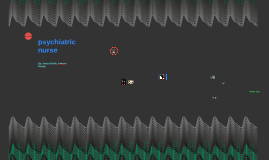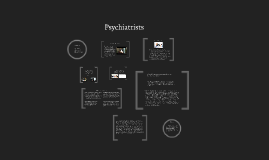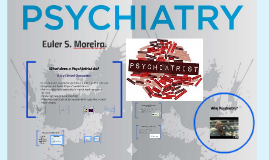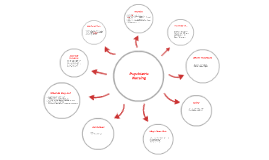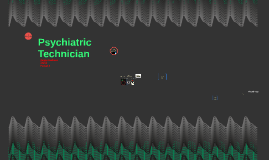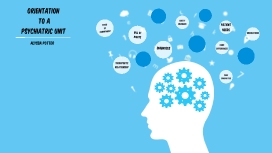Psychiatric
Transcript: Treatments When diagnosing patients psychiatrists can order or perform a full range of medical laboratory and psychological tests which, combined with discussions with patients, help provide a picture of a patient’s physical and mental state Psychiatrist Leah Marty Elearning East February 8, 2016 Psychiatrists People seek help from psychiatrists for many reasons. The problems can be sudden such as a panic attack, freighting hallucinations, thoughts of suicide, self harming, or just severe depression HELPING OTHERS . If you are interested in becoming a psychiatrist, you now have all the information you need in order to reach your goals. Interacting with patients, learning about them, and learning about the world around you through them, making a difference if at least at that very point in time that you interact, and seeing them appreciates me spending the extra time. Seeing the human experience in all its glamor, delusions, grandiosity, sadness, happiness and fear... and seeing people recover through stabilization, knowing that you have saved lives of patients and people in the community. While it may take a long time, it may be worth it if you like to help others improve their lives by conquering their mental demons. As a psychiatrist you will be learning, studying, diagnosing, and treating mental disorders from a medical standpoint in order to enrich the lives of your patients. If that sounds like you, then psychiatry is your calling. Financial security is another advantage of being a psychiatrist. According to a May 2009 report from the U.S. Bureau of Labor Statistics, the average annual salary for a psychiatrist is $163,660. This figure varies depending on the environment in which a psychiatrist is employed. If you want to be a psychiatrist at a private practice, then your days are very much like that of a psychologist or a private doctor -- it will be a lot of one-on-one interaction with your clients and you will go home in the afternoon Prospective psychiatrists will have to go through an undergraduate program, take a medical college admissions test and complete four years of medical school. After medical school you must complete a residency program, where you will work directly with patients under the supervision of a licensed psychiatric. Then to become licensed, these professionals must take the multi-step U.S medical Licensing Exam and also receive board certification through the American Board of Psychiatry and Neurology http://money.usnews.com/careers/best-jobs/psychiatrist http://www.psychiatry.org/patients-families/what-is-psychiatry http://www.huffingtonpost.com/felix-tarcomnicu/the-things-you-should-kno_b_3811957.html http://forums.studentdoctor.net/threads/best-and-worst-parts-of-being-a-psychiatrist.932424/ http://www.ehow.com/list_6677430_advantages-being-psychiatrist_.html The most significant advantage to being a psychiatrist is working in a profession devoted to helping others. Whether a patient is suffering from mental health issues related to a traumatic experience, substance abuse, difficult circumstances, depression or hereditary disorders, psychiatrists are trained to diagnose and treat these issues through a variety of methods, including investigative communication and prescription medication. Oftentimes, the gratification obtained from helping others is rewarding enough WORK ENVIRONMENT What is a Psychiatric? As with many medical fields, a career in psychiatry also provides some job security. A report from CNN’s Money.com recently ranked psychiatry 24th out of the 50 best jobs in America. The report factored in several job aspects including pay, quality of life and job growth. According to the study, jobs in psychiatry are projected to increase 14 percent over a 10-year period Psychiatrists use a variety of treatments, including various forms of psychotherapy, medications, psychosocial interventions and other treatments (such as electroconvulsive therapy or ECT), depending on the needs of each patient. Psychotherapy, sometimes called talk therapy, is a treatment that involves a talking relationship between a therapist and patient Psychiatrists are physicians that diagnose, treat and work to prevent disorders relating to the mind and mental health. Having undergone medical school and psychiatry residency programs, these professionals are equipped to understand the complex relationships between ailments of the mind and body What is it like? What do they do? Work Cited FINANCIAL STABILITY What it's like being at private practice vs. being at a hospital or medical center When practicing Psychiatry at a medical center or hospital, here is what you should expect: As a psychiatrist at a medical center or hospital, you can expect to start your days at any given time depending on your rotation. On your shifts, you will have your interns going over the events of the previous shift to catch you up. From there, you pick and choose between all the patients, deciding which ones need to






